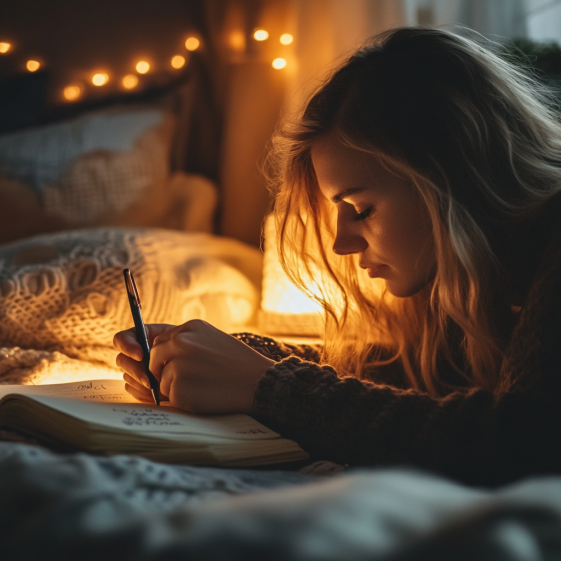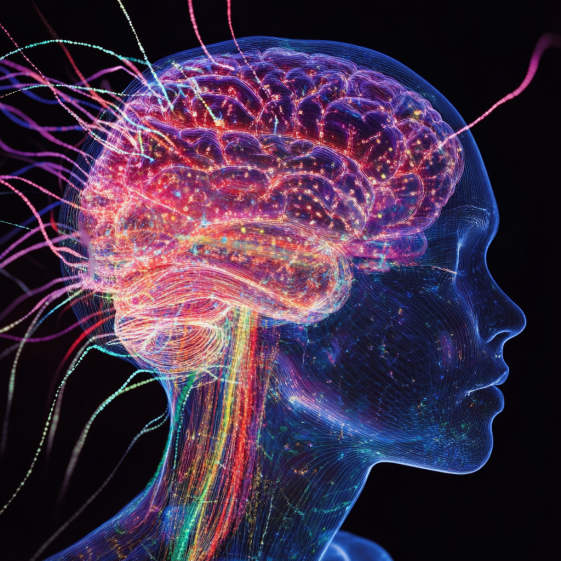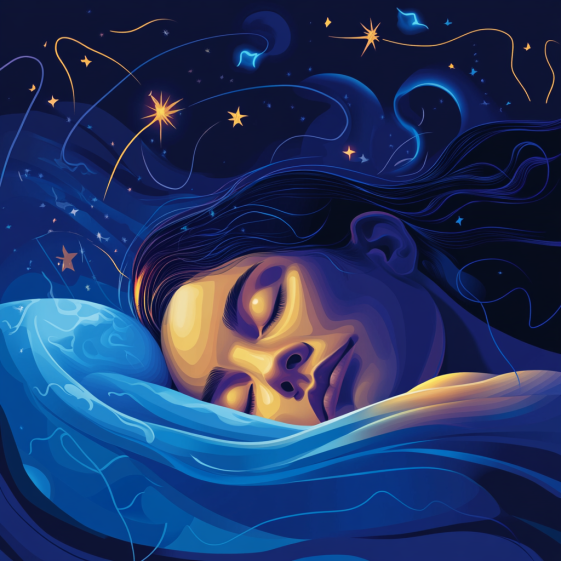Sleep and Hormone Balance: How to Reset Tonight
Sleep and hormone balance are directly linked: better sleep steadies cortisol,
improves insulin sensitivity, and brings hunger hormones back in line—so you wake up
calmer, energized, and in control of cravings.
Key Takeaways on Sleep and Hormone Balance
- Sleep and hormone balance are inseparable—poor sleep disrupts cortisol, insulin, leptin, and ghrelin.
- Prioritize a consistent schedule and a cool, dark, quiet room to restore rhythms fast.
- Even one solid night can reduce cravings and steady energy the next day.
- Evening wind-downs (yoga, journaling, herbal tea) help lower cortisol before bed.
- Magnesium-rich snacks and whole-food meals support insulin and deeper sleep.
Ever felt like your body’s just out of sync—you’re constantly tired, a little moodier than usual,
and your cravings seem to run the show? Turns out, your hormones might be the culprit. And guess what?
Sleep is a major player in keeping them balanced. When you prioritize sleep and hormone balance, your whole
system starts working in harmony.
If your sleep has been all over the place lately, it’s no wonder you might be feeling off. Poor sleep doesn’t
just make you groggy; it messes with your hormone levels, which control everything from your energy to your appetite
to your stress response. Let’s explore how sleep and hormone balance go hand in hand—and how you can reclaim both, starting tonight.
Why Sleep and Hormone Balance Matter So Much
Answer first: When sleep slips, your body’s hormonal “conductors” fall out of rhythm—affecting metabolism, mood, appetite, energy, and immunity.
Your body is like a beautifully tuned symphony, and hormones are the conductors. They regulate your metabolism, mood,
energy, appetite, and even your immune system. But when sleep is disrupted, those hormonal conductors get out of sync.
That’s why focusing on sleep and hormone balance is essential to feeling your best.
Many key hormones are tied to your circadian rhythm—your internal body clock that syncs with the day-night cycle.
Mess with your sleep, and you mess with:
- Melatonin: Your sleep signal. Poor habits throw off this crucial cue.
- Cortisol: Your stress hormone, which should fall at night but stays high with poor sleep.
- Insulin: Manages blood sugar, but lack of rest makes you more resistant to it.
- Leptin & Ghrelin: Your hunger and fullness hormones—and yes, sleep loss can send them into chaos.
- Growth Hormone: Critical for tissue repair and metabolism, but only peaks in deep sleep.

How Hormones and Sleep Are Connected: Research from the
National Institutes of Health
shows how sleep disturbances can impact hormonal rhythms and metabolism, increasing the risk for obesity, insulin resistance, and cravings.
All the more reason to make sleep and hormone balance a top priority.
Want deeper background on cycles? Explore our guide:
Optimize Your Sleep Cycle to Wake Up Refreshed.
What Happens When Sleep Gets Off Track?
Answer first: Just one rough night can tilt hormones toward hunger, stress, and poor blood sugar control—making the next day feel harder.
- Lower melatonin, making it harder to fall asleep the next night
- Higher cortisol, leading to anxiety, belly fat, and high blood pressure
- Poor insulin control, making blood sugar spikes more frequent
- Increased ghrelin (hunger) and decreased leptin (satiety), fueling overeating
- Suppressed growth hormone, slowing metabolism and recovery

This kind of hormonal disruption doesn’t just zap your energy. It can lead to long-term health issues if ignored.
EatingWell
explains how poor sleep can lead to increased cortisol levels and even raise your cholesterol.
For practical room upgrades that reinforce healthy sleep hormones, see
Serene Bedroom Sanctuary: 10 Essential Tips
and
Sleep Temperature Regulation.
The Cortisol Connection: Stress, Sleep & Hormones
Answer first: Cortisol should peak in the morning and taper at night; sleep debt keeps it elevated, disrupting rest and recovery.
Cortisol should naturally rise in the morning to wake you up and slowly decline as the day winds down. But when you’re running on empty
(hello, sleep debt), cortisol can stay high all night, messing with both your rest and your health. Keeping cortisol in check is a big
part of maintaining sleep and hormone balance.
How to Lower Cortisol and Reclaim Balance:
- 🌸 Try calming rituals like meditation, journaling, or gentle yoga before bed
- 🍵 Sip herbal teas like chamomile or valerian root to soothe your nervous system
- ❌ Skip caffeine after 2 PM and reduce screen time before bed

Need help building a relaxing wind-down?
Try our guides on guided sleep meditation
and best foods for deep sleep.
Sleep and Metabolism: Hormones That Control Hunger
Answer first: Sleep resets appetite hormones—reducing ghrelin, boosting leptin, and improving insulin sensitivity to curb cravings.
Ever crave carbs after a bad night’s sleep? That’s not just willpower—it’s hormonal. Sleep deprivation increases ghrelin (which makes you hungry)
and decreases leptin (which tells you you’re full). Meanwhile, insulin sensitivity tanks, making it harder to manage blood sugar.
Sleep and hormone balance are key to managing these cravings.
How Sleep Supports Metabolism:
- ✅ Boosts insulin sensitivity for more stable energy
- ✅ Keeps cravings in check by balancing ghrelin and leptin
- ✅ Supports fat burning through deeper, more restorative sleep

🍌 Pro Tip: Snack on magnesium-rich foods like almonds or bananas in the evening to support blood sugar balance and promote sleep and hormone balance.
5 Ways to Improve Sleep and Hormone Balance Naturally
Answer first: Small, steady habits—timing, stimulants, environment, nutrition, and stress—create compounding gains in hormone balance.
1. Stick to a Consistent Sleep Schedule
🕒 Try going to bed and waking up at the same time every day (yes, even weekends!) to reset melatonin and cortisol levels and support sleep and hormone balance.
2. Watch the Stimulants
🙵 Cut caffeine by mid-afternoon and skip nightcaps—alcohol disrupts REM sleep and hormone production, interfering with sleep and hormone balance.
3. Create a Cozy Sleep Environment
🌜 Set your bedroom up for success: cool (60–67°F), dark, quiet, and comfy. Blackout curtains and a white noise machine can work wonders for improving sleep and hormone balance.
Explore practical tools in White Noise Machine Types & Soundtracks.
4. Eat for Hormonal Health
🥑 Choose whole foods rich in omega-3s, magnesium, and vitamin D to support hormone production. Think leafy greens, fatty fish, and nuts—all part of a sleep and hormone balance-friendly diet.
For bedroom comfort upgrades tied to sleep quality, see our
Complete Guide to Bed Sizes.
5. Manage Daily Stress
🧠 A simple gratitude journal or 10 minutes of deep breathing before bed can lower cortisol and prep your body for sleep and hormone balance.
More stress-reducing ideas: 7 Proven Ways to Reduce Stress and Sleep Better Tonight.
When It’s Time to Talk to a Doctor
Answer first: If you’re sleeping 7–9 hours yet still feel off, discuss labs and possible sleep disorders with a professional.
Signs of Hormonal Imbalance to Watch For:
- Chronic fatigue
- Insomnia or irregular sleep cycles
- Mood swings, anxiety, or depression
- Unexplained weight changes
- Trouble managing stress
Your doctor can run tests to check for issues like thyroid dysfunction, adrenal fatigue, or sleep disorders like apnea.
FAQ
- What is the fastest way to improve sleep and hormone balance?
- Start with a consistent bedtime/wake time, a dark cool room, and a 30-minute wind-down. Even one good night can reduce cravings and steady energy.
- Can diet changes help balance hormones if I’m sleeping poorly?
- Yes—prioritize protein, fiber, and magnesium-rich foods while cutting late caffeine and alcohol. These habits support insulin sensitivity and deeper sleep.
- How long until sleep and hormone balance improves?
- Many people feel better within a few nights, while full rhythm resets can take 1–2 weeks of consistent routines.
- Do I need supplements for sleep and hormone balance?
- Not always. Start with routine, environment, and stress management. If needed, discuss options like magnesium or melatonin with your clinician.
Final Thought:
Your hormones want to work with you, not against you. And it all starts with sleep. Creating a calming bedtime routine, eating hormone-friendly foods,
and making your bedroom a cozy retreat can restore balance from the inside out. You deserve to wake up feeling rested, recharged, and ready to take on the day.
Never underestimate the power of focusing on sleep and hormone balance.
Want more dreamy ideas for your sleep routine? Explore all our sleep tips and guides.
Related reading from Cozy Bed Quarters
- Enhance Memory and Cognitive Function: Improve Sleep Quality
- How Bed Size and Sleep Quality Are Connected: What You Need to Know
- How a Nighttime Routine Helps You Sleep Faster & Wake Up Refreshed
Other reading we found popular
- Sleep Foundation — How Sleep Affects Your Hormones
- Healthline — 12 Natural Ways to Balance Your Hormones
- Medical News Today — How to Balance Hormones Naturally






